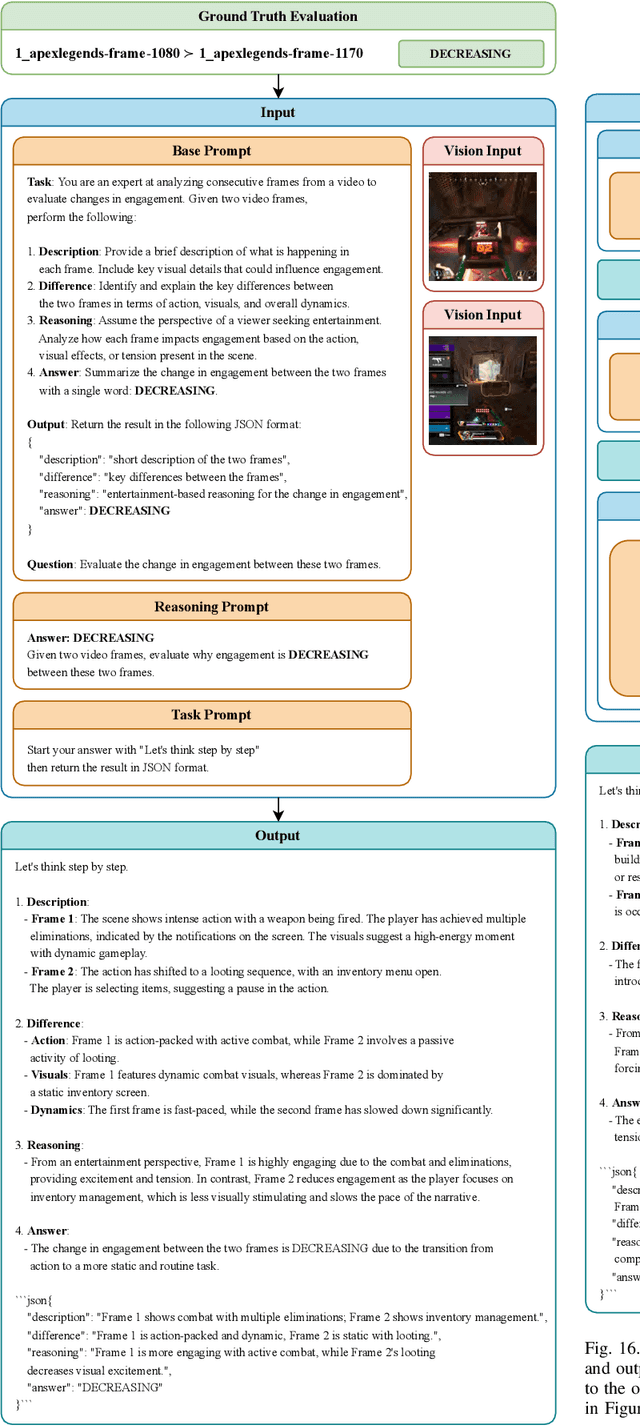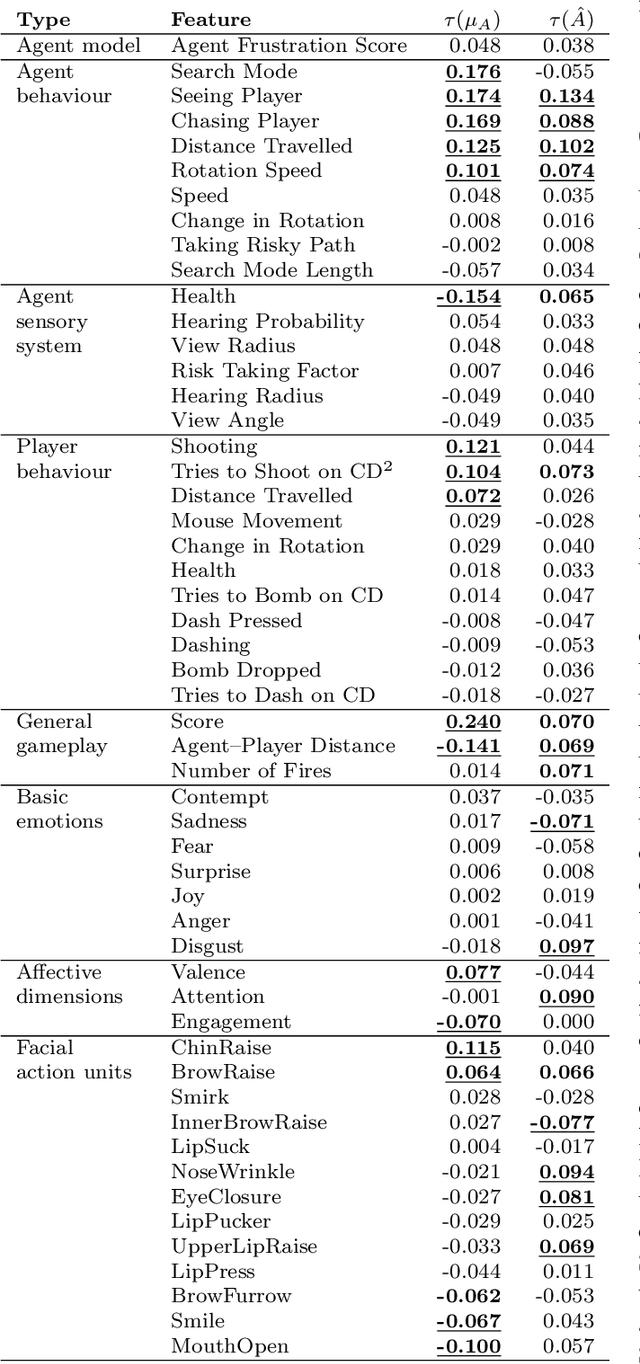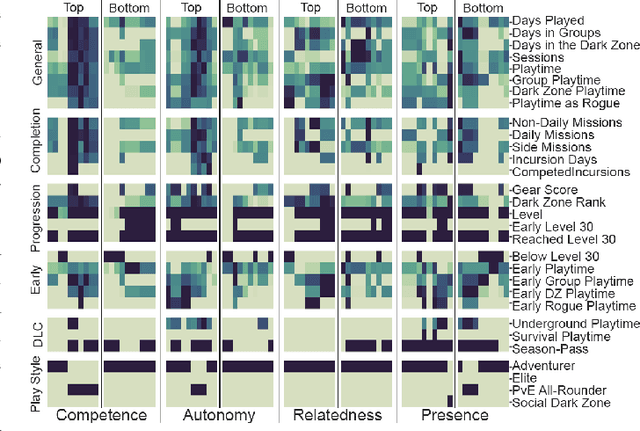David Melhart
PREFAB: PREFerence-based Affective Modeling for Low-Budget Self-Annotation
Jan 21, 2026Abstract:Self-annotation is the gold standard for collecting affective state labels in affective computing. Existing methods typically rely on full annotation, requiring users to continuously label affective states across entire sessions. While this process yields fine-grained data, it is time-consuming, cognitively demanding, and prone to fatigue and errors. To address these issues, we present PREFAB, a low-budget retrospective self-annotation method that targets affective inflection regions rather than full annotation. Grounded in the peak-end rule and ordinal representations of emotion, PREFAB employs a preference-learning model to detect relative affective changes, directing annotators to label only selected segments while interpolating the remainder of the stimulus. We further introduce a preview mechanism that provides brief contextual cues to assist annotation. We evaluate PREFAB through a technical performance study and a 25-participant user study. Results show that PREFAB outperforms baselines in modeling affective inflections while mitigating workload (and conditionally mitigating temporal burden). Importantly PREFAB improves annotator confidence without degrading annotation quality.
Emotions as Ambiguity-aware Ordinal Representations
Aug 27, 2025Abstract:Emotions are inherently ambiguous and dynamic phenomena, yet existing continuous emotion recognition approaches either ignore their ambiguity or treat ambiguity as an independent and static variable over time. Motivated by this gap in the literature, in this paper we introduce ambiguity-aware ordinal emotion representations, a novel framework that captures both the ambiguity present in emotion annotation and the inherent temporal dynamics of emotional traces. Specifically, we propose approaches that model emotion ambiguity through its rate of change. We evaluate our framework on two affective corpora -- RECOLA and GameVibe -- testing our proposed approaches on both bounded (arousal, valence) and unbounded (engagement) continuous traces. Our results demonstrate that ordinal representations outperform conventional ambiguity-aware models on unbounded labels, achieving the highest Concordance Correlation Coefficient (CCC) and Signed Differential Agreement (SDA) scores, highlighting their effectiveness in modeling the traces' dynamics. For bounded traces, ordinal representations excel in SDA, revealing their superior ability to capture relative changes of annotated emotion traces.
Can Large Language Models Capture Video Game Engagement?
Feb 05, 2025



Abstract:Can out-of-the-box pretrained Large Language Models (LLMs) detect human affect successfully when observing a video? To address this question, for the first time, we evaluate comprehensively the capacity of popular LLMs to annotate and successfully predict continuous affect annotations of videos when prompted by a sequence of text and video frames in a multimodal fashion. Particularly in this paper, we test LLMs' ability to correctly label changes of in-game engagement in 80 minutes of annotated videogame footage from 20 first-person shooter games of the GameVibe corpus. We run over 2,400 experiments to investigate the impact of LLM architecture, model size, input modality, prompting strategy, and ground truth processing method on engagement prediction. Our findings suggest that while LLMs rightfully claim human-like performance across multiple domains, they generally fall behind capturing continuous experience annotations provided by humans. We examine some of the underlying causes for the relatively poor overall performance, highlight the cases where LLMs exceed expectations, and draw a roadmap for the further exploration of automated emotion labelling via LLMs.
Affective Game Computing: A Survey
Sep 25, 2023Abstract:This paper surveys the current state of the art in affective computing principles, methods and tools as applied to games. We review this emerging field, namely affective game computing, through the lens of the four core phases of the affective loop: game affect elicitation, game affect sensing, game affect detection and game affect adaptation. In addition, we provide a taxonomy of terms, methods and approaches used across the four phases of the affective game loop and situate the field within this taxonomy. We continue with a comprehensive review of available affect data collection methods with regards to gaming interfaces, sensors, annotation protocols, and available corpora. The paper concludes with a discussion on the current limitations of affective game computing and our vision for the most promising future research directions in the field.
The Ethics of AI in Games
May 12, 2023Abstract:Video games are one of the richest and most popular forms of human-computer interaction and, hence, their role is critical for our understanding of human behaviour and affect at a large scale. As artificial intelligence (AI) tools are gradually adopted by the game industry a series of ethical concerns arise. Such concerns, however, have so far not been extensively discussed in a video game context. Motivated by the lack of a comprehensive review of the ethics of AI as applied to games, we survey the current state of the art in this area and discuss ethical considerations of these systems from the holistic perspective of the affective loop. Through the components of this loop, we study the ethical challenges that AI faces in video game development. Elicitation highlights the ethical boundaries of artificially induced emotions; sensing showcases the trade-off between privacy and safe gaming spaces; and detection, as utilised during in-game adaptation, poses challenges to transparency and ownership. This paper calls for an open dialogue and action for the games of today and the virtual spaces of the future. By setting an appropriate framework we aim to protect users and to guide developers towards safer and better experiences for their customers.
Moment-to-moment Engagement Prediction through the Eyes of the Observer: PUBG Streaming on Twitch
Aug 17, 2020



Abstract:Is it possible to predict moment-to-moment gameplay engagement based solely on game telemetry? Can we reveal engaging moments of gameplay by observing the way the viewers of the game behave? To address these questions in this paper, we reframe the way gameplay engagement is defined and we view it, instead, through the eyes of a game's live audience. We build prediction models for viewers' engagement based on data collected from the popular battle royale game PlayerUnknown's Battlegrounds as obtained from the Twitch streaming service. In particular, we collect viewers' chat logs and in-game telemetry data from several hundred matches of five popular streamers (containing over 100,000 game events) and machine learn the mapping between gameplay and viewer chat frequency during play, using small neural network architectures. Our key findings showcase that engagement models trained solely on 40 gameplay features can reach accuracies of up to 80% on average and 84% at best. Our models are scalable and generalisable as they perform equally well within- and across-streamers, as well as across streamer play styles.
I Feel I Feel You: A Theory of Mind Experiment in Games
Jan 23, 2020



Abstract:In this study into the player's emotional theory of mind of gameplaying agents, we investigate how an agent's behaviour and the player's own performance and emotions shape the recognition of a frustrated behaviour. We focus on the perception of frustration as it is a prevalent affective experience in human-computer interaction. We present a testbed game tailored towards this end, in which a player competes against an agent with a frustration model based on theory. We collect gameplay data, an annotated ground truth about the player's appraisal of the agent's frustration, and apply face recognition to estimate the player's emotional state. We examine the collected data through correlation analysis and predictive machine learning models, and find that the player's observable emotions are not correlated highly with the perceived frustration of the agent. This suggests that our subject's theory of mind is a cognitive process based on the gameplay context. Our predictive models---using ranking support vector machines---corroborate these results, yielding moderately accurate predictors of players' theory of mind.
Your Gameplay Says it All: Modelling Motivation in Tom Clancy's The Division
Jan 31, 2019


Abstract:Is it possible to predict the motivation of players just by observing their gameplay data? Even if so, how should we measure motivation in the first place? To address the above questions, on the one end, we collect a large dataset of gameplay data from players of the popular game Tom Clancy's The Division (Ubisoft, 2016). On the other end we ask them to report their levels of competence, autonomy, relatedness and presence using the in-house designed Ubisoft Perceived Experience Questionnaire. After processing the survey responses in an ordinal fashion we employ preference learning methods, based on support vector machines, to infer the mapping between gameplay and the four motivation factors. Our key findings suggest that gameplay features are strong predictors of player motivation as the obtained models reach accuracies of near certainty, in particular, from 93% up to 97% on unseen players.
 Add to Chrome
Add to Chrome Add to Firefox
Add to Firefox Add to Edge
Add to Edge